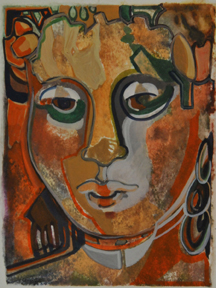
“Island Woman” by Marilyn Sears Bourbon
The children betrayed her.
Giovanni tells me his mother fed the children in every country they lived in. She worked for Doctor’s Across Borders and moved him and his sisters regularly – Guatemala, Peru – hot countries with brown faces and poverty. She would make big pots of rice and beans and feed all the children in their neighborhood. He never told me what she looked like but I imagine her with Donna Summer hair, her face thick with sweat, standing over a pot in a hot kitchen dimly lit with sunlight. She is spooning heaping pills of rice and beans in bowls for the children. I imagine Giovanni close to her, 5-years-old with stiff legs and a half moon smile watching his mother like a saint. He tells me there were always children in his house and his mother filled them full with food. I imagine they forget about hunger for as long as it takes for them to swallow a hot meal.
He says his mother was always his friend and he could always feel her love. She danced with him, placed his tiny body on tabletops and shook his hips to the slow rhythms of Billie Holiday or some other woman aching with the blues. She told him to cheer for himself because it was never guaranteed anyone else would. She built him into a strong, brave boy and gave him confidence in tight, long embraces. She is unconsciously preparing him for blindness.
In his teens, Giovanni told his mother he was gay. She threw parties for his out teenaged friends, those with no place to go but the internet for companionship. She gathered them in her home for PG meet-ups so they would know they weren’t coming out alone. He tells me she would put on disco music and watch them dance. She’d laugh that this was like being back in the 70s. He called the refuge her “underground homo railroad.” I imagine her smiling among the awkward 16-year-old boys who are just learning to sit still in their sex and skin. She is handing them drinks and food and encouraging their laughter. I imagine Giovanni, a slim teenager with dark cooper hair atop a soft developing body, gently touching the forearm of another boy as he laughs, knowing his mother is not far from view.
The children beat him until he lost his sight.
He tells me the attack was like the beating from the Quentin Tarantino movie, Kill Bill. I loved the film – the violence, the gore, the endless references to Japanese culture, Uma Thurman in a tight yellow cat suit. I remember her wielding a Samurai sword—one she had just been taught to fight with—determined to kill Bill. But she was no match for a tribe of fighters with years of experience. I can’t remember the scene where they nearly beat her to death and I could not seem to imagine Giovanni taking her place. Maybe it is hard to think of a human being beat like that – his 24 year-old-body bending at the end of lightning-swift kicks, a head filled with memories of his dancing mother hitting the pavement, the moment where sight got lost in blood and bone and hate.
He tells me he is still speculating on the motives of the boys who beat him, even after he published a memoir on the incident. They were friends, people he knew, people his mother had loved and fed and laughed with. She probably knew their parents, probably called them after they left her house to check and make sure they got home safely. These attackers were his childhood friends. Giovanni says they must have been angry that he was going off to college, making a future for himself. I’ve seen this happen to groups of brown boys; like crabs in a barrel, they’d rather have company in their sorrows than see one another succeed. He says he can tell when his book reviewers are white because they don’t understand his reasoning.
The children left him in the dark.
After Giovanni became blind, his mother came to live with him. She never gave him false hope. She told him blindness would be hard but he would be okay.
I imagine she is the light keeper guiding him through their house. He is a grown man learning to re-adjust his dead eyes to light. To remember her face, he takes in the smells of her and tastes every country they ever lived in. He learns to trace her age with his fingertips and listens to her breathe in order to calculate the distance between them.
I imagine her tucking him in at night. He is leaning his head against her as she leads him to his bedside. When she has folded him safely under the covers, she pushes her cheek to his before she turns out the lights to join him in the dark. I imagine Giovanni feeling her face push into a gentle smile. She is reminding him of laughter.
Ashley Young is a black feminist queer dyke; poet, non-fiction writer and teaching artist. She is a non-fiction 2011 Lambda Literary Foundation Fellow and a 2010 Poetry Fellow for Voices of Our Nations Arts Foundation Retreat for Writers of Color. She is the author of a chapter in Hot and Heavy: Fierce Fat Girls on Life, Love and Fashion edited by Virgie Tovar (Seal Press 2012) and is currently working on her first novel “Girl With The Unicorn Earrings”. Ashley is a freelance writer and works as an editorial assistant. She lives in New York City with her partner and family, including a pride of four cats.
Read an interview with Ashley here.

Pingback: Interview with Ashley Young | Rkvry Quarterly Literary Journal
Pingback: Writerly Updates: Articles and Event Highlights | Indigo's Theory